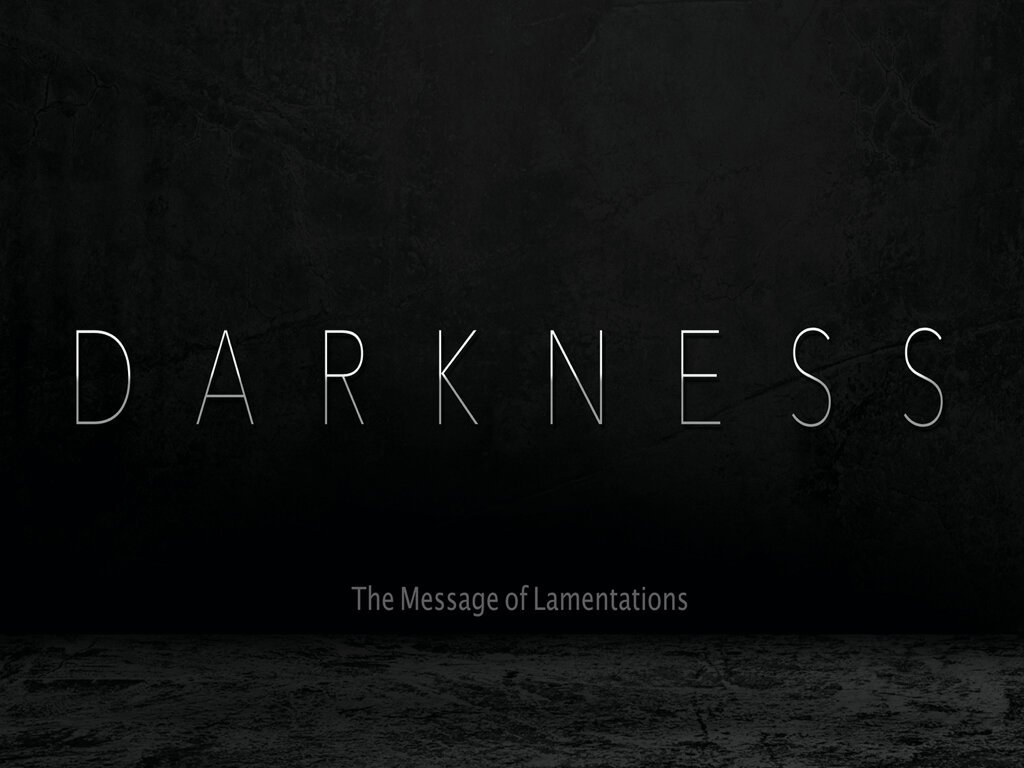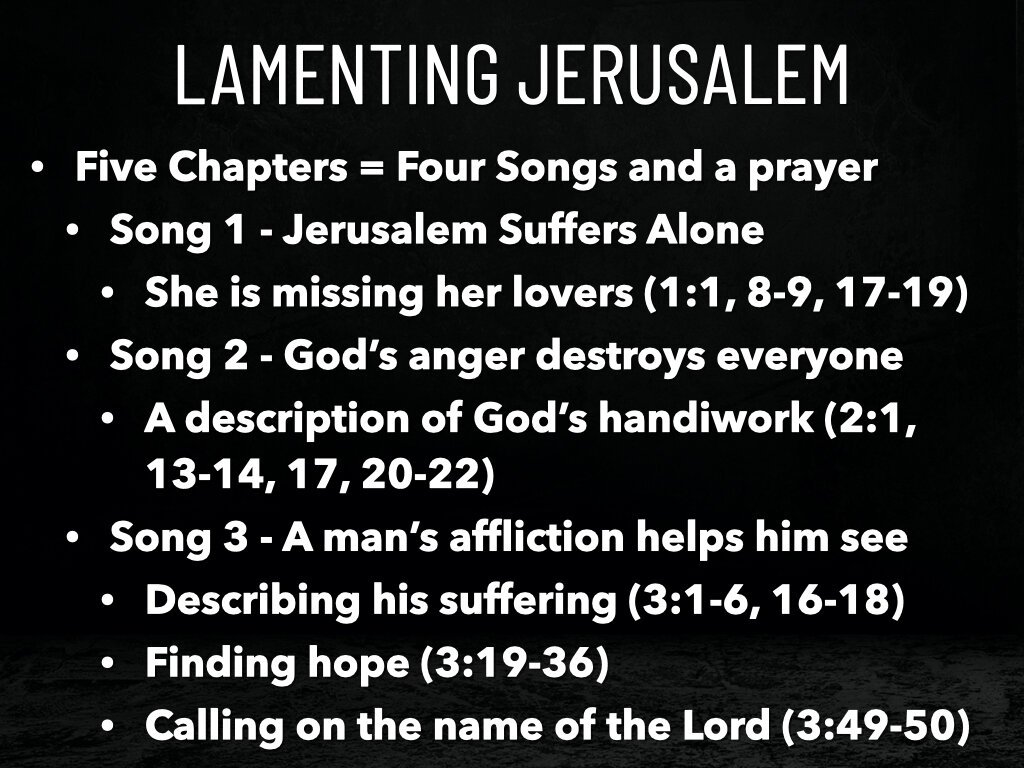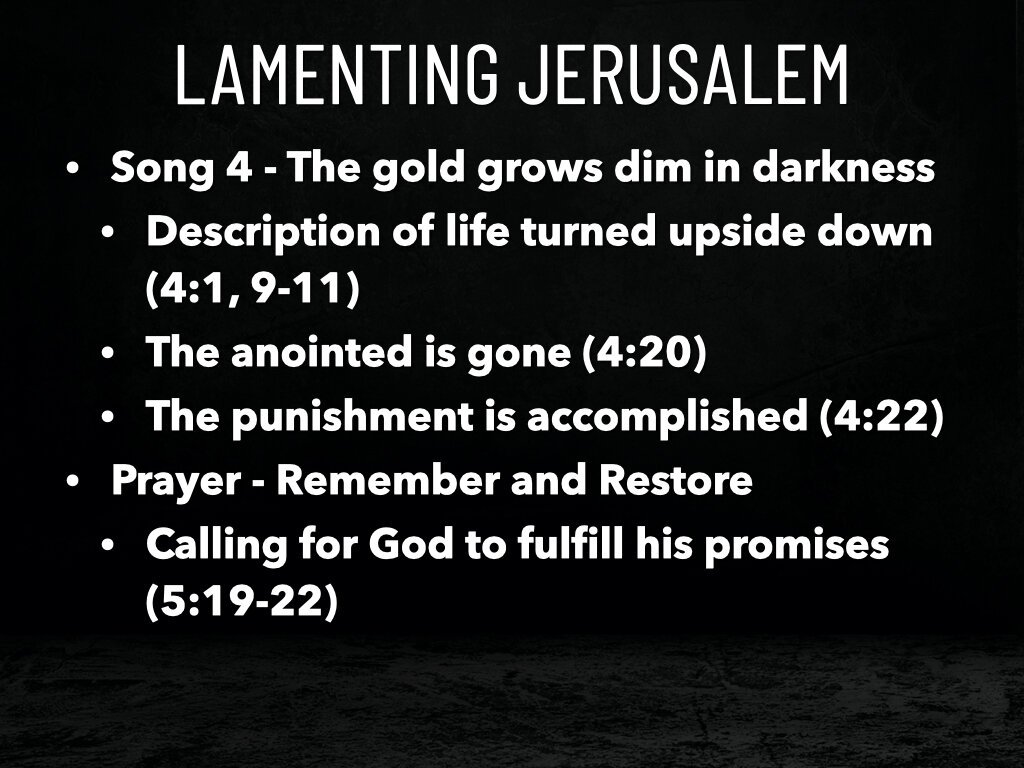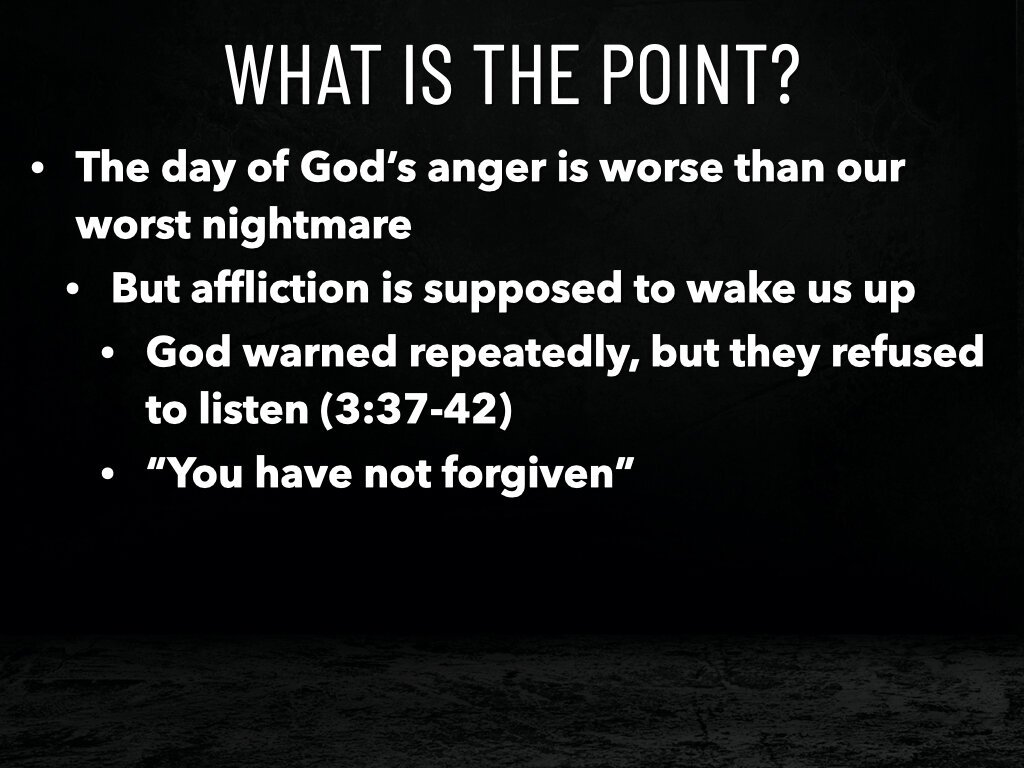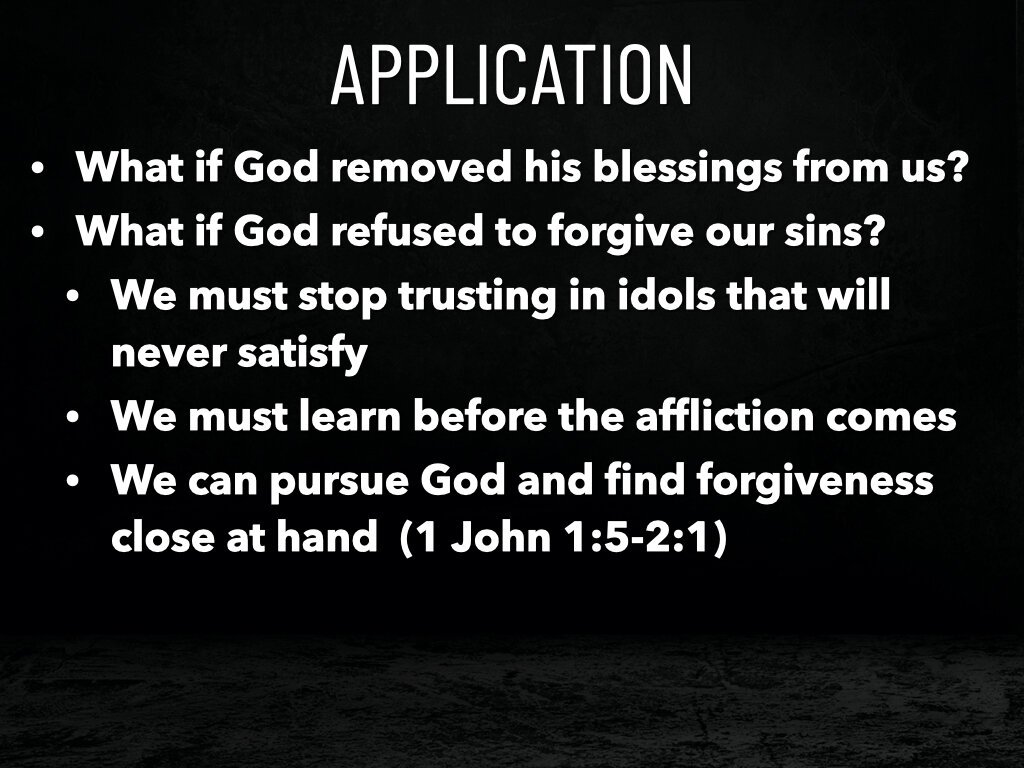Darkness (Lamentations)
Our goal is to develop an understanding of the book of Lamentations, but I would like us to start with a backdrop. In the book of Jeremiah, we learn about the destruction of Jerusalem.
Jeremiah 52:4--16 (ESV) --- 4 And in the ninth year of his reign, in the tenth month, on the tenth day of the month, Nebuchadnezzar king of Babylon came with all his army against Jerusalem, and laid siege to it. And they built siegeworks all around it. 5 So the city was besieged till the eleventh year of King Zedekiah. 6 On the ninth day of the fourth month the famine was so severe in the city that there was no food for the people of the land. 7 Then a breach was made in the city, and all the men of war fled and went out from the city by night by the way of a gate between the two walls, by the king’s garden, and the Chaldeans were around the city. And they went in the direction of the Arabah. 8 But the army of the Chaldeans pursued the king and overtook Zedekiah in the plains of Jericho, and all his army was scattered from him. 9 Then they captured the king and brought him up to the king of Babylon at Riblah in the land of Hamath, and he passed sentence on him. 10 The king of Babylon slaughtered the sons of Zedekiah before his eyes, and also slaughtered all the officials of Judah at Riblah. 11 He put out the eyes of Zedekiah, and bound him in chains, and the king of Babylon took him to Babylon, and put him in prison till the day of his death. 12 In the fifth month, on the tenth day of the month---that was the nineteenth year of King Nebuchadnezzar, king of Babylon---Nebuzaradan the captain of the bodyguard, who served the king of Babylon, entered Jerusalem. 13 And he burned the house of the Lord, and the king’s house and all the houses of Jerusalem; every great house he burned down. 14 And all the army of the Chaldeans, who were with the captain of the guard, broke down all the walls around Jerusalem. 15 And Nebuzaradan the captain of the guard carried away captive some of the poorest of the people and the rest of the people who were left in the city and the deserters who had deserted to the king of Babylon, together with the rest of the artisans. 16 But Nebuzaradan the captain of the guard left some of the poorest of the land to be vinedressers and plowmen.
The Babylonians destroyed Jerusalem after a three and a half year siege. Notice how this text describes that destruction. He focuses on two key events. First, King Zedekiah is captured, and his children are killed before his eyes are removed. Second, the Temple was destroyed. These would have been two devastating events in Judah because the promises made to David are lost. There is no longer a descendant on David's throne and no longer a place for God's name to dwell with men. But this section does not fully describe what it was like in the city during that time. Lamentations gives us further understanding of what has gone on. From the outset, that sounds like a book we would want to avoid. After all, who wants to hear about the ugly details of God's judgment? How could that benefit us? The benefits are numerous. This is one of the most helpful books for Christians to understand suffering. The word lament means to lift up a mourning song. Multiple laments are recorded in scripture. It ranks up there with Job.
Lamentations
The first thing we need to know as we look into the book of Lamentations is the fact that this is a book of poetry. That means that it is not like your typical prophesy. God does not speak to his people directly in this book. It might be easier for us to understand this book by comparing it to lament Psalms. The book's structure is like Hebrew poetry, but it has a special feature that is not commonly used. This book has four acrostic poems and one prayer at the end. Acrostic means that he uses the alphabet letters to start each line, going from beginning to end. It would be like us creating a poem that goes from A to Z. The author is composing a complete explanation of the topic.
Song 1 - Jerusalem Suffers Alone (1)
The book starts with a startling statement.
Lamentations 1:1 (ESV) --- 1 How lonely sits the city that was full of people! How like a widow has she become, she who was great among the nations! She who was a princess among the provinces has become a slave.
Jerusalem sits alone. The nations she has attached herself to are nowhere to be found. This text talks about Jerusalem as a woman who was adulterous and had many lovers. This imagery reminds us of the prophet Hosea who married a harlot named Gomer. In that story, Gomer abandoned Hosea to sleep with men she thought would provide everything she needed, but they used her and abandoned her. Jeremiah is telling us that is precisely what happened in Jerusalem. God has allowed his people to suffer with none to help.
Lamentations 1:8--9 (ESV) --- 8 Jerusalem sinned grievously; therefore she became filthy; all who honored her despise her, for they have seen her nakedness; she herself groans and turns her face away. 9 Her uncleanness was in her skirts; she took no thought of her future; therefore her fall is terrible; she has no comforter. “O Lord, behold my affliction, for the enemy has triumphed!”
Like Hosea's wife was exposed and ashamed, Jerusalem has been opened up and lost all of its security. Notice the repetition of the phrase, "She has no comforter." This phrase is repeated in verses 16, 17, and 21. All of those who honored her have abandoned her.
Verses 12-16 change over to the first person as though Jerusalem is groaning over the rejection they have received. Verse 17 again repeats the idea that Zion (Jerusalem) reaches out her hand and finds no one willing to help her.
Verses 18-22 have a tone of confession. It is as though this stubborn and rebellious city finally realizes that it is wrong.
Lamentations 1:18--19 (ESV) --- 18 “The Lord is in the right, for I have rebelled against his word; but hear, all you peoples, and see my suffering; my young women and my young men have gone into captivity. 19 “I called to my lovers, but they deceived me; my priests and elders perished in the city, while they sought food to revive their strength.
Judah's adultery is always pictured as idolatry, and the point Jeremiah wants to convey is that idols fail to save. At the end of this life, our idols will do nothing for us. They do not provide any security or comfort. Only God was able to provide that. Like we saw in Hosea 2, Israel thought that the idols were giving them satisfaction when God was doing that all along. Now he removes his blessings and reveals how empty those idols are.
Song 2 - God's Anger Destroys Everyone (2)
The next song introduces it's theme in the first line as well.
Lamentations 2:1 (ESV) --- 1 How the Lord in his anger has set the daughter of Zion under a cloud! He has cast down from heaven to earth the splendor of Israel; he has not remembered his footstool in the day of his anger.
This song is all about the anger of the Lord. If you look down through the first ten verses, you will get a picture of God's anger. Nearly every line begins with a statement of some judgment God has given against his people. Jeremiah describes God's destruction in over thirty different ways. Then, in verse ten, he starts to illustrate what life is like under siege. The elders sit in silence, covered in dust and sackcloth. Jeremiah has cried so much that he is sick because he sees the dead children everywhere. He watches as children beg their mothers for food and aren't given any. Then, something interesting happens in verses 13 and 14.
Lamentations 2:13--14 (ESV) --- 13 What can I say for you, to what compare you, O daughter of Jerusalem? What can I liken to you, that I may comfort you, O virgin daughter of Zion? For your ruin is vast as the sea; who can heal you? 14 Your prophets have seen for you false and deceptive visions; they have not exposed your iniquity to restore your fortunes, but have seen for you oracles that are false and misleading.
At this point, Jeremiah asks the people how he could give any words of comfort. These people set up prophets who filled them with comfort. They told them what they wanted to hear, and this is the result. Verses 16-18 show us that this was God's judgment for their rebellion, and they were getting what they deserved.
Lamentations 2:17 (ESV) --- 17 The Lord has done what he purposed; he has carried out his word, which he commanded long ago; he has thrown down without pity; he has made the enemy rejoice over you and exalted the might of your foes.
God's anger has accomplished what it set out to accomplish. He has fulfilled his words of warning and judged his persistently rebellious people. Verse 18 transitions into an exhortation. Jeremiah calls for the city to cry out to the Lord. He wants them to call for God to see their suffering and relent now that he has accomplished his purpose.
Lamentations 2:18--20 (ESV) --- 18 Their heart cried to the Lord. O wall of the daughter of Zion, let tears stream down like a torrent day and night! Give yourself no rest, your eyes no respite! 19 “Arise, cry out in the night, at the beginning of the night watches! Pour out your heart like water before the presence of the Lord! Lift your hands to him for the lives of your children, who faint for hunger at the head of every street.” 20 Look, O Lord, and see! With whom have you dealt thus? Should women eat the fruit of their womb, the children of their tender care? Should priest and prophet be killed in the sanctuary of the Lord?
This song ends by repeating the truth that God has killed his people on the day of his anger. That phrase is repeated twice in the final two verses.
Song 3 - A Man's Affliction Helps Him See (3)
Chapter 3 is the same size as chapters one and two, but it has three times as many verses. Why? That's because Jeremiah wanted to emphasize the acrostic in this song. Instead of starting a three-line section with the acrostic, he gives the acrostic on every line. So the first three verses all begin with the first letter of the Hebrew alphabet, "Alef." What is so important about this song that Jeremiah would place this emphasis on it?
Lamentations 3:1--3 (ESV) --- 1 I am the man who has seen affliction under the rod of his wrath; 2 he has driven and brought me into darkness without any light; 3 surely against me he turns his hand again and again the whole day long.
To start, he brings up the fact that he is a man who has suffered affliction at God's hand. The first seventeen verses are all about God making him live in darkness, and suffer excruciating pain.
Lamentations 3:6 (ESV) --- 6 he has made me dwell in darkness like the dead of long ago.
Lamentations 3:16--18 (ESV) --- 16 He has made my teeth grind on gravel, and made me cower in ashes; 17 my soul is bereft of peace; I have forgotten what happiness is; 18 so I say, “My endurance has perished; so has my hope from the Lord.”
He is a man without hope, having forgotten what it is like to be happy. Can you imagine being forced to chew gravel? That, to me, is one of the most graphically painful images in the book. In verses 19-21, he transitions.
Lamentations 3:19--21 (ESV) --- 19 Remember my affliction and my wanderings, the wormwood and the gall! 20 My soul continually remembers it and is bowed down within me. 21 But this I call to mind, and therefore I have hope:
He finds hope in the fact that his suffering has brought him low. I consider this to be one of the most important ideas in this book. This man looks at his affliction, and he sees where he is with respect to God. He is poor in spirit. But did you notice what he says in verse 21? Being poor in spirit gives him hope.
Lamentations 3:22--36 (ESV) --- 22 The steadfast love of the Lord never ceases; his mercies never come to an end; 23 they are new every morning; great is your faithfulness. 24 “The Lord is my portion,” says my soul, “therefore I will hope in him.” 25 The Lord is good to those who wait for him, to the soul who seeks him. 26 It is good that one should wait quietly for the salvation of the Lord. 27 It is good for a man that he bear the yoke in his youth. 28 Let him sit alone in silence when it is laid on him; 29 let him put his mouth in the dust--- there may yet be hope; 30 let him give his cheek to the one who strikes, and let him be filled with insults. 31 For the Lord will not cast off forever, 32 but, though he cause grief, he will have compassion according to the abundance of his steadfast love; 33 for he does not afflict from his heart or grieve the children of men. 34 To crush underfoot all the prisoners of the earth, 35 to deny a man justice in the presence of the Most High, 36 to subvert a man in his lawsuit, the Lord does not approve.
We could spend all our time gushing over these verses, and it would be time well spent. But for the sake of time, I want to point you to two phrases.
The first one is at the beginning of this section, between verses 22 and 23. He says, "His mercies never come to an end; they are new every morning;" What a remarkable statement of faith. Jeremiah has this belief that God has eternal mercy toward him. Every time he wakes up, he knows that God can press the reset button. He can begin again to battle against sin.
The second phrase is found in verse 33. After saying he will not cast off forever, he says he is the cause of all of this grief. But then, he says, "He will have compassion according to the abundance of his steadfast love; for he does not afflict from his heart or grieve the children of men." This is pure gold in our efforts to understand the affliction of men under the wrath of God. God's heart does not desire to afflict or grieve anyone. He wants man to be happy and enjoy the creation he has given him. But he can't allow man to corrupt and destroy his creation, and he knows man will be happiest when he submits to God's law. God's desires are always for our good.
The rest of this song describes how Jeremiah has learned to grow from discipline and call out to God for help. He has learned to trust in God during the direst situations. This is truly a song about seeing God as good in our afflictions.
Song 4 - The Gold Grows Dim During Siege (4)
The fourth song begins with a statement of maturity. The gold and stones, which were so beautiful and breathtaking, have lost their luster. This song is full of allusions to other prophets. Jeremiah says that the horrifying judgment of every single prophet has been proven true. All of their wealth has disappeared, and they all sit in the city, starving to death. Children ask for food, but no one gives them any. Compassionate women boil their children. It is a horrifying scene.
Lamentations 4:11 (ESV) --- 11 The Lord gave full vent to his wrath; he poured out his hot anger, and he kindled a fire in Zion that consumed its foundations.
One of the most thought-provoking verses to me is verse 20, where he points out that the Lord's anointed has been captured. Psalm 2 gave so much assurance to the Lord's anointed, the king of Judah and Israel. God said that though the nations rage against the Lord's anointed, he would deliver him and destroy the enemies.
Lamentations 4:20 (ESV) --- 20 The breath of our nostrils, the Lord’s anointed, was captured in their pits, of whom we said, “Under his shadow we shall live among the nations.”
The end of this song ends the song section of the book so let's look at the last verse.
Lamentations 4:22 (ESV) --- 22 The punishment of your iniquity, O daughter of Zion, is accomplished; he will keep you in exile no longer; but your iniquity, O daughter of Edom, he will punish; he will uncover your sins.
He says that the punishment, fulfilling all of the prophecies, has been accomplished. Now, God is focusing on Edom. Now, God is focusing his attention on those who have lifted up their hand against God's people.
Prayer - Remember and Restore (5)
After this song, Jeremiah gives one more section of twenty-two verses. But this is not an acrostic. This is a prayer to God. He asks God to remember what has happened to Israel. The severity of their punishment needs to be remembered, as the severity of the flood. The destruction of Jerusalem was an atrocity. Then, he ends his prayer with these words.
Lamentations 5:19--22 (ESV) --- 19 But you, O Lord, reign forever; your throne endures to all generations. 20 Why do you forget us forever, why do you forsake us for so many days? 21 Restore us to yourself, O Lord, that we may be restored! Renew our days as of old--- 22 unless you have utterly rejected us, and you remain exceedingly angry with us.
He calls for God to remember his promises and restore his people. He prays with hope in God's reign over mankind.
What Is The Point?
This book shows us what real darkness looks like and why God must judge sinful people. It gives the most comprehensive description of God fulfilling his prophecies of judgment against Judah's nation for their sins. But it also helps us understand how those judgments were supposed to develop the people. Chapter 3 is critical in this development. That's why it is emphasized with the triple acrostic. Isn't it amazing how someone could experience all of that suffering, witness those atrocities, recognize that God is behind it, and still say that God is righteous and good?
Lamentations 3:37--42 (ESV) --- 37 Who has spoken and it came to pass, unless the Lord has commanded it? 38 Is it not from the mouth of the Most High that good and bad come? 39 Why should a living man complain, a man, about the punishment of his sins? 40 Let us test and examine our ways, and return to the Lord! 41 Let us lift up our hearts and hands to God in heaven: 42 “We have transgressed and rebelled, and you have not forgiven.
This text explains very thoroughly what has happened and why Jeremiah will not complain about it. Notice as you read through this book that Jeremiah refuses to complain. He will state the facts about what has happened. He will describe how difficult it has been for him, and he mourns over his suffering. But not once does he say that God is unjust. Instead, he says we should "test and examine our ways, and return to the Lord." Verse 42 gives the most straightforward explanation of what has happened, saying, "We have transgressed and rebelled, and you have not forgiven."
Application
What if God doesn't forgive us of our sins? What would it look like for God to remove all of the blessings we have enjoyed? Many people have different mentalities about hell, but this book gives us a picture of the darkness of hell. This book tells us about the judgment of God, resulting in dark and tremendous suffering. God wants us to avoid that fate by examining our ways and lifting up our hearts and our hands to him, seeking him and seeking his forgiveness. We have an advocate with the Father to find forgiveness through Jesus Christ. This picture does not have to be our future.
Please don't put your trust in idols that do not provide the comfort they promise. They will not satisfy. God satisfies. If we stop making things in our life ultimate, we will find that we have no reason to pursue sinful desires. We don't need more money. We don't need bigger houses or better jobs. We don't need a new wife or the latest technology. We need a greater love for God and be closer to him today than we were yesterday.

